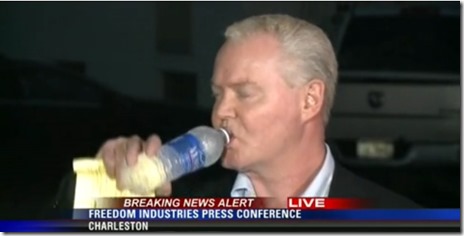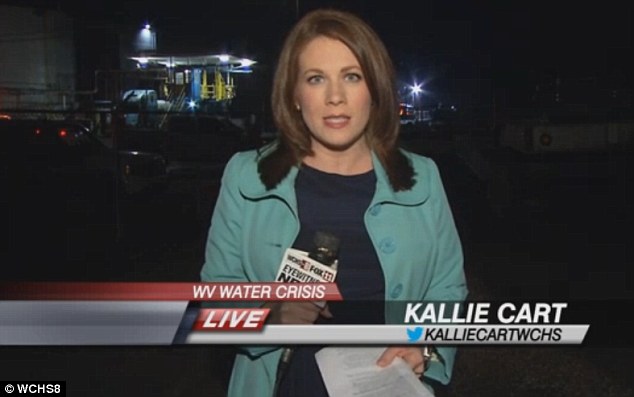This Press Conference Is Over! (Or Maybe It Isn’t?)
By now, you’ve probably heard about the West Virginia chemical leak that contaminated water for 300,000 local residents.
Gary Southern, the president of Freedom Industries (the company responsible for the leak) gave an epically bad initial press conference late last week. Although much of it was a mess, most of the subsequent media coverage focused on his unfortunate habit of sipping bottled water throughout the presser—a strange message to send considering that hundreds of thousands were without water.
Blogger Dave Statter summarized the company’s inept initial response thusly:
“Before the press conference Freedom Industries issued a brief statement (here) that, much like the press conference, was completely inadequate for this situation. The statement is more the kind of information you would expect via social media and a company website in the initial stages of this incident…not a day and a half later.”
Since this story has already received so much coverage, I’m going to focus on a smaller—but remarkable—moment that hasn’t gotten as much notice.
Five minutes into his nationally televised press conference, Mr. Southern decided he had enough. He announced that the press conference was over and started to walk away.
But then a reporter informed him that he couldn’t leave yet—it could be said that she scolded him into staying—and Southern sheepishly returned to the microphones.
CEO Gary Southern: “At this moment in time, I think that’s all that we have time for, so thanks for coming, thanks for your questions.” (walks away)
WCHS-TV Reporter Kallie Cart: “We have more questions. Hey, hey, hey, hey. We’re not done.”
Southern: “You’re not done?” (returns to microphones)
Cart: “We’re not done. Does anyone else have any other questions?”
The moment I love the most in that exchange is that Cart wasn’t even keeping the CEO there for herself—she was insisting he stay to answer questions from other reporters. Upon listening to the audio, there’s no question who was in charge at that moment. It wasn’t Gary Southern.
Where did Southern go wrong?
He ignored this advice about running a press conference, as originally published in my book, The Media Training Bible: 101 Things You Absolutely, Positively Need to Know Before Your Next Interview:
“When you finish your introductory statement (but before you open the floor to questions), tell reporters that you have a specific amount of time available to answer questions. In the early stages of a crisis, you might only allot five to ten minutes for questions…By announcing the time available at the outset, you won’t look like you’re abruptly ending the gathering when you call for the last question. That’s especially helpful if you’re being barraged by hostile questions—because you already announced your intention to end the question period after an allotted time, you can’t be accused of leaving in haste.
Count down the remaining time once or twice during the press conference. You might say, ‘I see we have five minutes left. Let’s see if we can get in two more questions.’”
I’d add one additional point. When announcing that you have limited time for questions, you should wrap that announcement inside a virtue. For example, Southern could have said:
“I am overseeing our company’s operational response, and my priority is to help people get safe drinking water back as quickly as possible. I’ll answer your questions for the next five minutes or so, but then I have to get back to leading that effort.”
A grateful h/t to reader Deborah Brody (@DBMC), who pointed that moment out to me.
Come join us for one of our fun, fast-moving and content-rich media and presentation training workshops! Click here to see our upcoming sessions.





Mr. Southern seemed very ill at ease doing this, which likely contributed to the debacle. I suspect that’s why he drank so much water–this throat was getting dry due to stage fright. You could even hear his voice crack on occasion. I wonder if public speaking is not his forte, in which case he should have had more and better coaching, and more and better talking points.